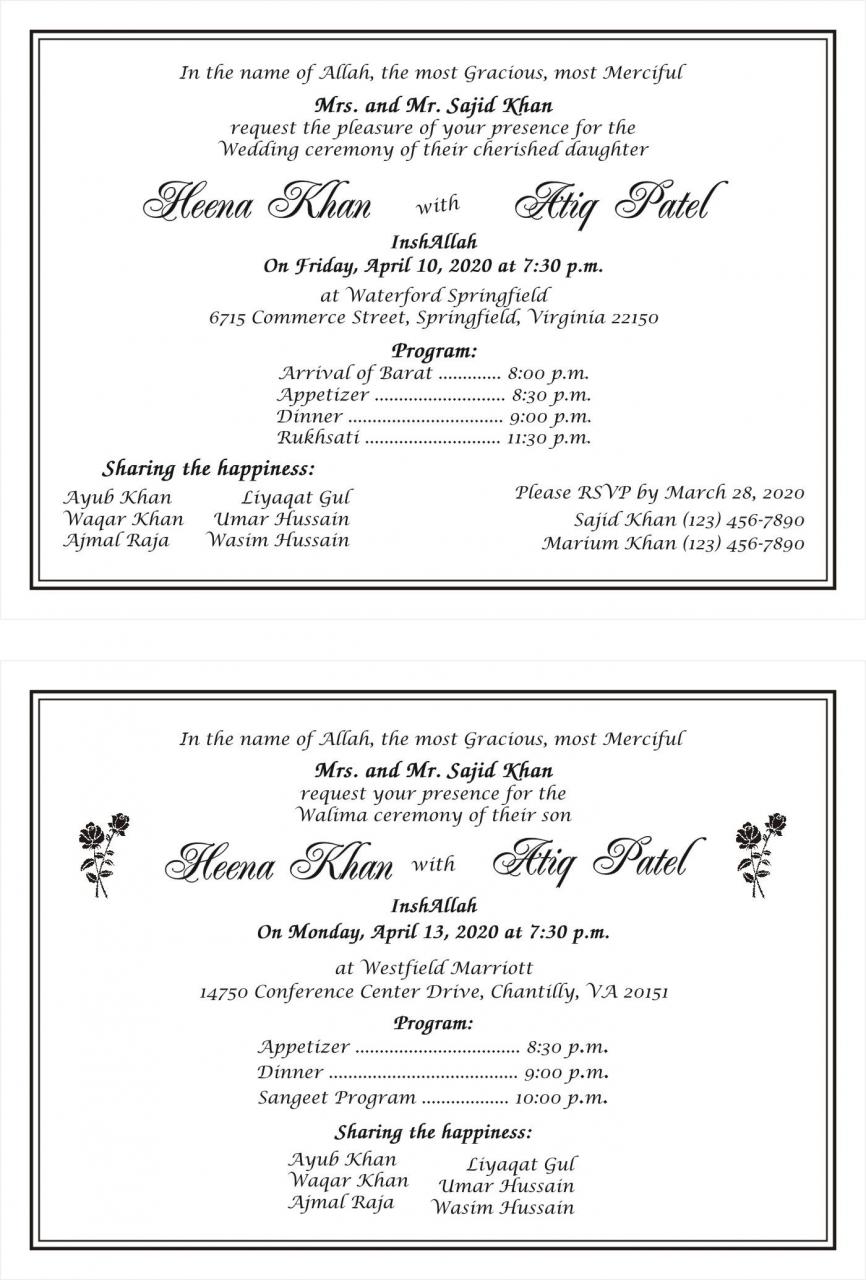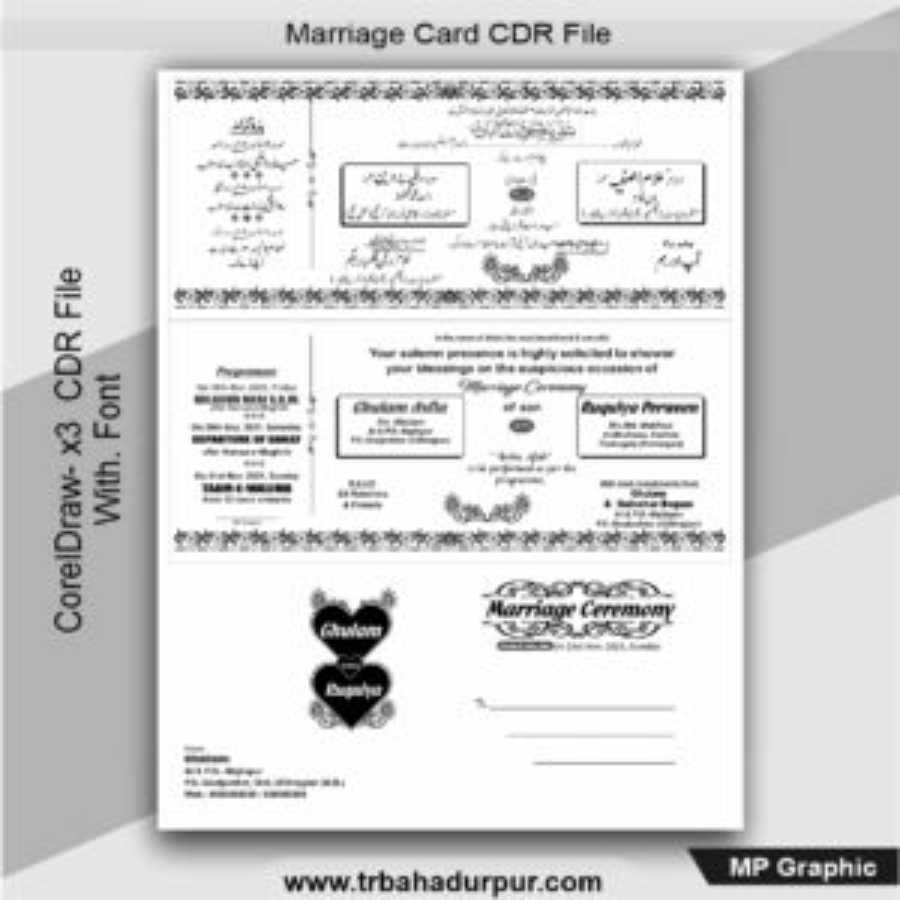
Wedding Invitations: A reflection of Muslim Matrimony, Tradition, and Love
Marriage is a sacred bond that represents the love and commitment shared between two individuals. Within Muslim culture, marriage holds significant religious and cultural importance, and the wedding invitation serves as a symbol of this momentous occasion. In this comprehensive guide, we will delve into the world of Muslim marriage cards, exploring their history, meaning, and contemporary trends.
The Marriage Card: A Window into Cultural Heritage
Muslim marriage cards have a rich history rooted in Islamic traditions. They are typically adorned with intricate Arabic calligraphy, Islamic motifs, and vibrant colors, showcasing the cultural heritage and identity of the couple. These cards often include religious verses, blessings, and prayers, invoking divine grace upon the union.
Crafting a Unique Invitation: Personalizing the Celebration
Creating a Muslim marriage card is an opportunity for couples to express their personal style and preferences. They can choose from traditional designs featuring gold leaf and henna patterns or opt for modern interpretations with vibrant colors and contemporary fonts. The invitation wording is equally significant, thoughtfully crafted to convey the joy, love, and excitement of the upcoming celebration.
The Meaning of Muslim Marriage: A Sacred Union
In Islam, marriage is considered an essential part of life, a sacred union that creates a new family and extends the couple’s responsibilities within the community. The marriage contract, known as ‘Nikah,’ is a legal and religious agreement that formalizes the relationship between the bride and groom. Through this contract, the couple pledges to love, respect, and support each other throughout their lives.
Unveiling the Significance of Islamic Symbols: Blessings and Guidance
Muslim marriage cards often incorporate Islamic symbols that hold deep significance and meaning. For instance, the crescent moon and star, representing Islam, symbolize hope, new beginnings, and divine protection. The Fatima’s Hand, an ancient symbol of protection and strength, is also commonly used. These symbols not only add a touch of tradition but serve as a reminder of the spiritual dimension of the union.
Modern Trends: Infusing Tradition with Style
While Muslim marriage cards have a strong foundation in tradition, contemporary trends have brought about new innovations and styles. Couples may choose to include photographs or personalized messages, creating a more personal touch. The use of digital invitations, with interactive features like RSVP trackers and photo galleries, has also gained popularity. However, amidst these modern adaptations, the essence of tradition remains, ensuring that the cards continue to reflect the sacred nature of Muslim matrimony.
Tips and Expert Advice: Enhancing the Invitation Experience
- Attention to Detail: Take care in selecting the design, wording, and materials for your invitation. Every element should reflect the significance of the occasion.
- Customization: Personalize your card with unique touches, such as incorporating your names, wedding hashtag, or a meaningful quote.
- Cultural Considerations: Respect both your own and your partner’s cultural heritage when designing the invitation.
- Timely Distribution: Send out invitations well in advance to allow guests ample time to respond and make arrangements.
Frequently Asked Questions: Addressing Common Queries
Q: What is the significance of the color green in Muslim marriage cards?
A: Green is often associated with prosperity, fertility, and paradise in Islamic tradition.
Q: Is it appropriate to include photographs on Muslim marriage cards?
A: While some couples choose to include photographs, it is important to consider the cultural and religious sensitivities of both families.
Q: What should be included in the wording of a Muslim marriage invitation?
A: The invitation should include the date, time, and venue of the ceremony, as well as the names of the couple and their parents.
Q: How far in advance should Muslim marriage cards be sent out?
A: Invitations should be sent out 6-8 weeks before the wedding to allow guests sufficient time to prepare.
Conclusion: A Cherished Keepsake of Love and Unity
Muslim marriage cards are not mere invitations; they are cherished keepsakes that capture the joy, love, and cultural heritage of a sacred union. They serve as a tangible reminder of the special bond shared between the bride and groom and their families. Whether traditional or contemporary in style, the Muslim marriage card continues to be a powerful symbol of love, faith, and the enduring bonds of matrimony. Are you interested in knowing more about Muslim marriage cards and the traditions surrounding them? Share your questions or comments below and let’s continue the exploration together.

Image: trbahadurpur.com